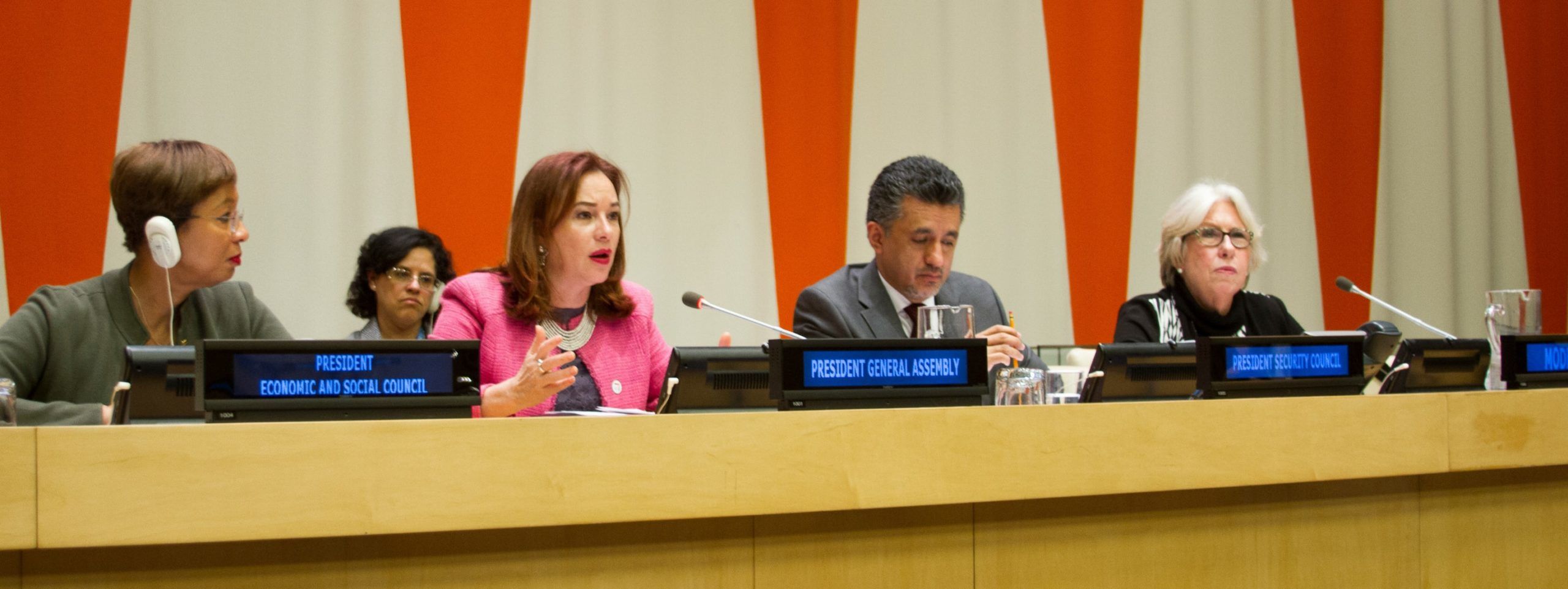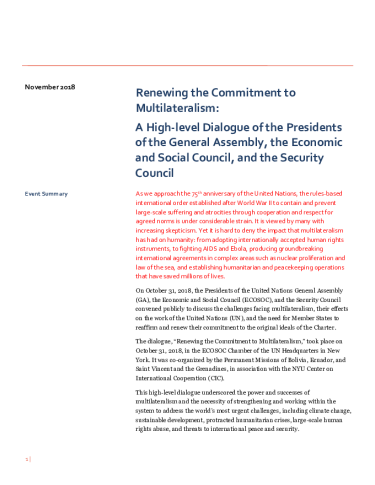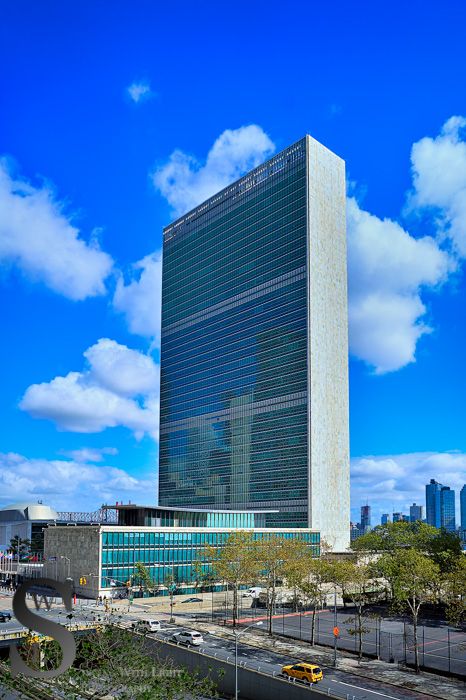As we approach the 75th anniversary of the United Nations, the rules-based international order established after World War II to contain and prevent large-scale suffering and atrocities through cooperation and respect for agreed norms is under considerable strain. It is viewed by many with increasing skepticism. Yet it is hard to deny the impact that multilateralism has had on humanity: from adopting internationally accepted human rights instruments, to fighting AIDS and Ebola, producing groundbreaking international agreements in complex areas such as nuclear proliferation and law of the sea, and establishing humanitarian and peacekeeping operations that have saved millions of lives.

On October 31, 2018, the Presidents of the United Nations General Assembly (GA), the Economic and Social Council (ECOSOC), and the Security Council convened publicly to discuss the challenges facing multilateralism, their effects on the work of the United Nations (UN), and the need for Member States to reaffirm and renew their commitment to the original ideals of the Charter.
The dialogue, “Renewing the Commitment to Multilateralism,” took place on October 31, 2018, in the ECOSOC Chamber of the UN Headquarters in New York. It was co-organized by the Permanent Missions of Bolivia, Ecuador, and Saint Vincent and the Grenadines, in association with the NYU Center on International Cooperation (CIC).
This high-level dialogue underscored the power and successes of multilateralism and the necessity of strengthening and working within the system to address the world’s most urgent challenges, including climate change, sustainable development, protracted humanitarian crises, large-scale human rights abuse, and threats to international peace and security.
It emphasized the value of discussing development, peace and security, and human rights in support of collective objectives. Three key areas were highlighted:
- The current threats and challenges to multilateralism
- An urgent need for reform in the multilateral system
- The recommitment required from Member States to turn dialogue into responsibility and action
Participants
The dialogue brought together the President of the General Assembly (PGA), H.E. Ms. María Fernanda Espinosa Garcés, the President of ECOSOC, H.E. Ms. Inga Rhonda King, Permanent Representative of Saint Vincent and the Grenadines, and the Security Council President for the month of October, H.E. Mr. Sacha Sergio Llorentty Soliz, Permanent Representative of Bolivia. The event was moderated by Ms. Karina Gerlach, Senior Fellow at CIC.
Following a short introduction by the moderator and statements by the three Presidents, the conversation shifted towards a moderated interactive dialogue with representatives of Member States from a wide geographical range.
Multilateralism under threat
Speakers were united in highlighting the challenges facing multilateralism today, both as a concept and in practice. Statements focused on the irreplaceable role of the UN and ways to reinvigorate the image of multilateralism as a tool for solving global challenges around the world.
The Presidents and Member States expressed concern at the increasing polarization in the world that has eroded so much of the mutual trust that was developed by Member States since the UN’s inception.
The PGA, Ms. Espinosa Garcés, highlighted the special occasion of gathering the presidencies of the three UN bodies held by Latin America and the Caribbean countries for a fundamental objective: renewing the commitment to multilateralism. She focused on three main areas: first, multilateralism as a tool to overcome global challenges; second, the need for coordination and aligned work of the main bodies of the UN; and third, the leading role and contribution of the GA in strengthening multilateralism. She described the current difficult international climate, caused by slow economic recovery, inequality, climate change, humanitarian and migratory crisis, as well as geopolitical challenges as a critical juncture. Solutions to these diverse but interrelated problems require more—not less—concerted and collective actions, which in turn demand a more efficient and responsive multilateral system. The President noted that “the bodies of the United Nations must work like clockwork, as pieces of the same machine that move this organization towards its objectives of development, peace, and security; to promote and protect human rights.” Given the oft-repeated narrative of multilateralism as a threat to sovereignty, it was important to emphasize and demonstrate that in helping Member States grapple with problems, the UN and its instruments can enhance national sovereignty, not diminish it. Coordination between the various organs of the UN was of paramount importance to support the implementation of agreements such as the 2030 Agenda, which the PGA highlighted, is an example of what can be achieved with multilateralism.
The President of ECOSOC, Ambassador King, noted that despite the pessimistic view of the state of the world espoused by many, it was important also to maintain perspective on the many achievements of humanity. She stressed that there had in fact been many successes in the past 73 years, thanks to cooperation through the UN. In recounting the novel way in which Member States had negotiated and reached agreement on the 2030 Agenda, she stressed that it was possible for the international community to have imagination and develop innovative ways to deal with new issues and problems. She expressed her unyielding faith in the human capacity to reimagine processes and responses but noted that clarity, leadership, and vision were required to fight the crisis facing multilateralism today. Member States were urged to step up and reconfirm the enduring relevance of the original vision of the UN Charter.
Ambassador Llorentty Soliz noted that much has been achieved through multilateralism in the area of peace and security and decried what he saw as a deliberate attack on multilateralism by a number of groups and countries. He stressed that multilateralism was also under attack due to the proliferation of unilateral actions. He called for a stronger commitment to implementing the UN Charter so as to prevent “multilateralism à la carte,” in which countries can pick and choose what aspects of the international system they adhere to. He also stressed that the UN, and the Security Council, in particular, needed to be reformed so as to become more democratic and representative of today’s world.
Member States stressed the need for the UN to lead change from within but not without taking into consideration the world outside. They argued in favor of building a transformative and responsive multilateral system focused on prevention, and working constructively with Member States that did not see multilateralism in the same way or were skeptical.
Reform is critical
It was confirmed by all participants that in an increasingly multipolar and interconnected world, there is a need for more, not less, multilateral cooperation. There was also a consensus, however, on the need to reform the UN multilateral system, particularly considering the Secretary-General’s proposed reforms. Suggestions included creating more space and opportunities for open and frank dialogue, where the collective experience, wisdom, and skills of Member States could be harnessed. Speakers also highlighted the importance of listening to and understanding people outside the UN, and communicating better with them to ensure the body becomes a more interconnected forum, and better understood and supported by the people it is intended to serve. It was stressed that this was a collective responsibility and that Member States needed to become active advocates of change within, and between, their respective regional and other groups.
The PGA noted the urgency of moving to the implementation phase of the reform process, proposed by the Secretary-General, and that it is important to continue collective efforts for making the UN increasingly relevant for all (this was also a main theme for UNGA73). Ambassador Llorentty Soliz and Ambassador King also emphasized the importance of strengthening the UN through the revitalization of its bodies. Ambassador Llorentty Soliz noted in particular the the need for the various UN bodies to respect each other’s mandates and prerogatives, to avoid encroachment, and instead to look for complementarity. The 2030 Agenda was agreed by all to be the focus and framework for the UN system’s activities. Business as usual and the status quo were no longer acceptable.
Recommitment required
The PGA asserted that this meeting was an affirmation of the UN’s commitment to cooperation, dialogue, and coordinated work, while Ambassador King and Ambassador Llorentty Soliz called for this event to be the cornerstone of a series of ongoing events to keep the conversation alive. Ambassador Llorentty Soliz also noted that through a series of events within the Security Council, such as the meetings on “Purposes and principles of the Charter of the UN” in February, or the one on “Upholding international law within the context of the maintenance of international peace and security,” held in May, or the debate on “Strengthening multilateralism and the role of the UN,” held in November, Member States showed their engagement to the UN system.
Member States welcomed the opportunity to hold this dialogue, were impressed with the frankness of the discussion, and concurred that it was only the beginning of the conversation. They asked the Presidents to consider similar events in the future to continue the conversation.
There was consensus that a way must be found to ensure a simple but strong recommitment by Member States to multilateralism and the spirit and ideals of the Charter. It would be important to “renew vows,” with a new political declaration focusing on the responsibility of all states and based on tolerance and understanding of all. A number of suggestions were raised including a meeting of the heads of the six principal organs to produce a draft recommitment document that could then be given to the membership for review. It would be auspicious to use the occasion of the 75th anniversary of the United Nations in 2020 and to start preparations now.
Conclusion
In concluding, the PGA, Ms. Espinosa Garcés, confirmed that this meeting was only the beginning of a discussion. She was gratified by the excellent turnout and exchange and thanked CIC for its help in making the meeting happen. She focused on the need to come up with constructive ways to engage countries that were not present and were questioning the benefits of multilateralism and referred again to the 2030 Agenda as an important example of how achieving this is possible. Ambassador King encouraged continued dialogue as the best avenue to build mutual trust and to strengthen multilateralism. Ambassador Llorentty Soliz stressed that even though additional hurdles will continue to present themselves, discussions must be kept alive because the UN and multilateralism are crucial to dealing with many of today’s challenges.
It is essential to reform, decrease duplication, increase efficiency, and bring the UN closer to the people. Trust and broad dialogue remain key to making the UN more effective, transparent, and inclusive. It is also imperative to recommit to the ideals of the Charter.
This meeting report was jointly prepared by the Permanent Missions of Bolivia, Ecuador, and Saint Vincent and the Grenadines, and the NYU Center on International Cooperation and is being distributed by President of the UN General Assembly. The full PDF can be downloaded here.



